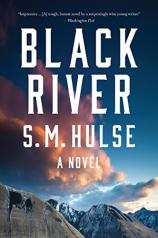Black River
Review
Black River
The “Black River” of the title of S. M. Hulse’s wonderful debut novel refers to a number of things. It is the book’s geographical setting, a Montana town whose only major employer is a state penitentiary. It is also the title of a slow, mournful song --- not a lament, we are hastened to be told early on --- composed for the fiddle by a tragic figure named Wes Carver. And yes, it is a metaphor for the sad and dark theme of revenge that runs strong and deep through this book, from first page to last.
Wes Carver was born in Black River, a town where sons, almost to a rule, do what their fathers do: work as corrections officers. The joys of his taciturn life were his wife, Claire, and his fiddle playing. He had a natural affinity for the latter, which brought him local renown outside of his primary occupation. However, an incident 20 years ago changed that forever. During a riot at the prison, Wes was held captive by an inmate named Bobby Williams and tortured, leaving him emotionally and physically scarred. Worse, his physical injuries left him unable to play. Wes and Claire eventually left Black River for Spokane, Washington, where he obtained work as a shopping mall security guard.
"[T]he pacing is perfect, so much so that one is tempted to speed through it. Please don’t. Hulse’s strong and true prose deserves to be read slowly so that her characters, major and minor, can be fully appreciated."
BLACK RIVER opens with Claire, Wes’ remaining joy, on her deathbed. A few days later, he is returning to Black River with dual purpose: he intends to bury Claire’s ashes in their former hometown and to appear at Black River’s penitentiary, where Williams is scheduled to have a parole hearing. Wes’ return exposes him to a series of emotional land mines, the primary one being his interactions with his stepson, Dennis. Wes and Dennis have a relationship best described as strained, if not estranged. Incidents from their shared past during Dennis’ teenage years, unspoken and otherwise, hang between them even as they uncomfortably share their mutual sorrow over the loss of Claire.
Wes also slowly renews his relationship with Arthur Farmer, whose past is closely intertwined with his. It was Arthur who introduced Claire and Wes, and, in addition to being Wes’ friend, neighbor, band member and co-worker, had become his brother-in-law. The meeting and interaction between the two men is uneasy, for reasons that are gradually revealed, and made more so when Arthur attempts to dissuade Wes from appearing and speaking at Williams’ parole hearing.
Wes’ only solace seems to be the connection he makes with Scott Bannon, a troubled teenager whose father is incarcerated at the penitentiary. Scott is a fish out of water in Black River, but he has a natural affinity for music that seems almost as strong as Wes’. Wes takes the young man under his wing and begins teaching him how to fiddle using the long-prized instrument that he no longer can play himself. The undertow of Black River is strong, and Wes’ efforts may not be enough to reach Scott. Meanwhile, as the hearing date approaches, Wes is determined to obtain justice for what he has lost, one way or another.
BLACK RIVER is not a long book, but is a very deep one. A caution here: the pacing is perfect, so much so that one is tempted to speed through it. Please don’t. Hulse’s strong and true prose deserves to be read slowly so that her characters, major and minor, can be fully appreciated.
Reviewed by Joe Hartlaub on February 6, 2015





